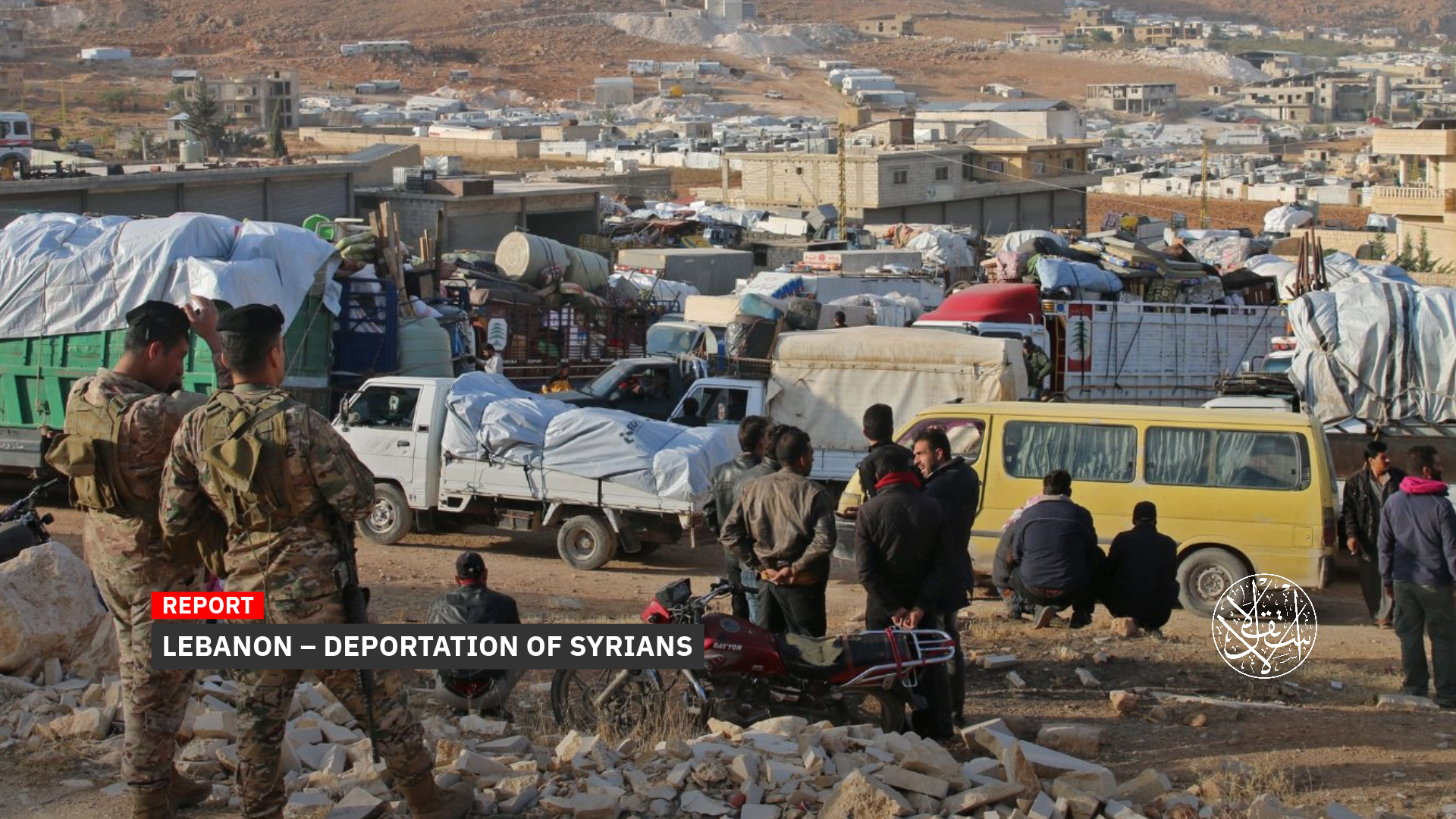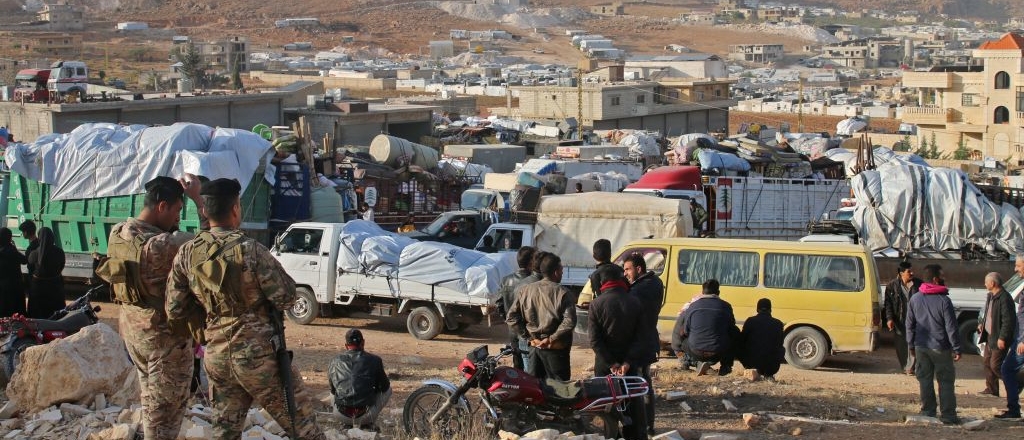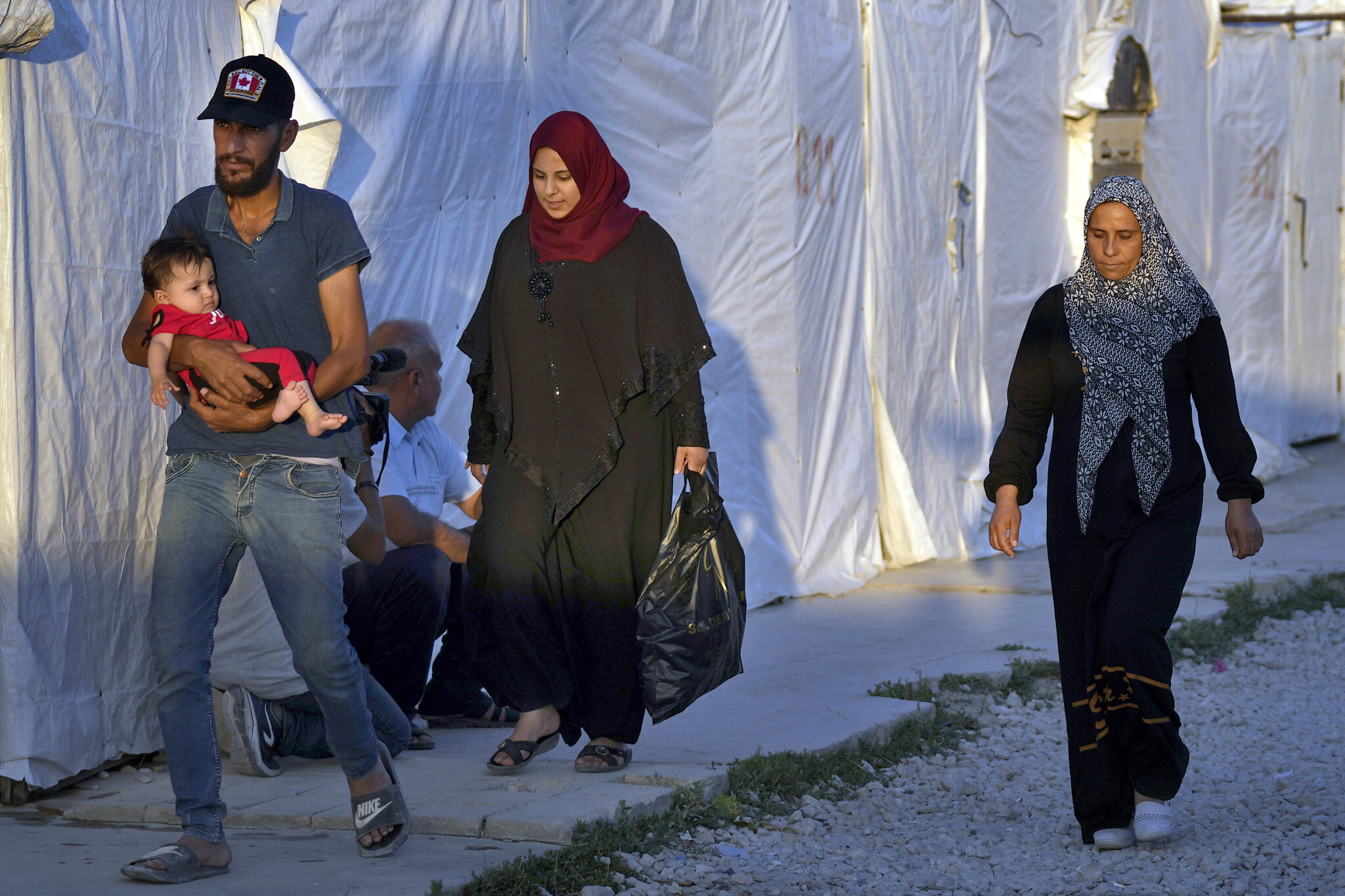Embracing the Russian–Assad Discourse: Why Has Lebanon Escalated Deportations of Syrians?

The official discourse in Lebanon regarding the deportation of Syrian refugees seems to align with the Russian perspective, which implies their return to their war-torn homeland that is still ruled by the same security apparatus that prompted their escape from Syria in 2011.
Since then, the Syrian regime has not altered its oppressive stance towards Syrians, while Lebanon continues its efforts to repatriate refugees residing within its borders. This effort is aimed at achieving a political transition and a stable, secure environment in accordance with international resolutions.
A Unified Tone
The prevailing rhetoric of the ruling authority in Lebanon, which shares close ties with the Bashar al-Assad regime, concerning the refugee issue, converges with the ultimate Russian objective of closing “the refugee chapter.” This is seen as a significant symbol of the regime’s oppression of its people and their displacement.
This sentiment was underscored by Lebanon’s Acting Minister of Displaced Persons, Issam Charafeddine, who affirmed his readiness to engage directly with the refugee issue in Syria. He emphasized that this matter lies within the purview of Prime Minister Najib Mikati.
Charafeddine said in statements made on July 28, 2023, that he had been requested to provide a report on his visit to Damascus, consultations with the Minister of Social Affairs, Hector Hajjar, and coordination for the appointment of a new delegation head.
The Lebanese minister highlighted that Russia’s role in Syria has successfully achieved both field and political advancements, contributing to bolstering Syria’s Arab and regional presence.
Hence, the minister noted, “Moscow seeks to capitalize on the realized achievements and translate them practically in the areas of reconstruction and the return of displaced individuals through the activation of reconciliation committees within Syria.”
Charafeddine claimed that “this paves the way for the return of the displaced, particularly considering that nearly 90 percent of Syrian territory is under state control. For this, we must express our gratitude to Russia.”
He also acknowledged the visit of Alexander Lavrentiev, the special envoy of Russian President Vladimir Putin, to Damascus on July 25, 2023. During this visit, Lavrentiev discussed the issue of Syrian refugee return and the steps taken in this regard with President Bashar al-Assad.
Charafeddine highlighted that the ideas and proposals being discussed at the Arab and international levels to resolve this issue underscore the importance of Russia’s ongoing efforts to find a humanitarian solution to the refugee problem, ensuring their safe return to their homes and villages.
In his meeting with Assad, Lavrentiev stated that Russia and Syria are committed to the humanitarian aspect of the refugee issue and categorically reject any attempts to politicize it.
Refugee Battleground
Since the beginning of 2023, Lebanese authorities have expedited the issue of repatriating Syrian refugees, whether voluntarily or forcibly. However, this process has remained limited to a few families.
Meanwhile, human rights organizations have documented cases of refugees being forcibly returned, subjecting them to arrests by Syrian intelligence agencies.
According to a security official on April 21, 2023, as reported by AFP, Lebanese authorities handed over around 50 Syrian refugees to the Assad regime within a span of approximately two weeks.
This development followed the recent formulation of a plan by the Lebanese government to “send” 15,000 refugees back to Syria every month.
Beirut views this as a necessity due to the severe economic and living crisis that has plagued Lebanon since 2019.
However, the plan faced rejection from the United Nations, which affirmed that security has not yet been reestablished in Syria, urging Lebanon to exercise caution.
Official data reveals that there are approximately two million Syrian refugees on Lebanese soil, with around 830,000 of them registered with the United Nations.
April 2023 witnessed a new wave of calls for the expulsion of Syrian refugees who have fled the grasp of the Bashar al-Assad regime since 2011.

Confronting the Refugee Issue
In response to these developments, the National Coalition for Syrian Revolution and Opposition Forces strongly condemned the Lebanese government’s actions in a statement dated April 21, 2023. They expressed deep concern over the arrest of Syrian refugees by the Lebanese government and their subsequent deportation to areas under regime control, criticizing the continuous violations against them.
Amnesty International issued a statement in May 2023, asserting that the Lebanese authorities must immediately cease the forced deportation of refugees to Syria.
The organization expressed concerns that these refugees might be exposed to the risk of torture or persecution at the hands of the Syrian government.
The organization affirmed that the Lebanese army’s raids on homes occupied by Syrian families across various locations in the country, including Bourj Hammoud in the capital Beirut, resulted in the deportation of dozens of refugees who had entered the country irregularly or held expired residency permits.
Embracing the Russian Vision
What’s noteworthy about Lebanon’s recent actions is the alignment with the Russian perspective on the repatriation of Syrian refugees. This alignment comes at a strategic time for Lebanon, which is grappling with a complex and challenging political situation, including the ongoing presidential vacuum since the end of October 2022.
Moscow seeks to reintegrate the Syrian regime with the international community, bypassing the political solution and ensuring the survival of the Assad regime while weakening the opposition’s position.
This strategic alignment takes into account that the refugee issue is one of the most pressing matters compelling the regime to relinquish power in accordance with UN Security Council Resolution 2254. This resolution paves the way for a political solution in Syria, including a transitional phase.
Given that the refugee issue is a bargaining chip in the hands of Lebanon’s ruling political class when dealing with the international community, occasionally exploited for economic and political gains, Beirut has escalated its position towards Syrian refugees.
In April 2023, Minister of Social Affairs Hector Hajjar stated in a media interview that the matter has become a “life and death” issue, warning of “serious demographic changes that could turn us into refugees in our own country.”

Simultaneously, there has been a resurgence of hate speech against Syrians and a renewed demand, particularly through social media, by numerous Lebanese citizens to expel them from the country.
Syrians have faced a range of pressures, including curfews imposed at specific times, detentions, forced deportations, house raids, and limitations on residency transactions.
The authorities view the refugee issue as a burden and attribute their presence to exacerbating the ongoing economic collapse since 2019.
However, Lebanon’s official alignment with Russia concerning refugees disregards the international and UN calls for Beirut to halt unlawful deportations of Syrian refugees, out of fear that they might face torture or persecution by the Assad regime upon their return to a war-ravaged homeland.
Financial Ambitions
In this context, journalist Alia Mansour noted that “everything we hear in Lebanon regarding the repatriation of refugees is coordinated with the Assad regime. The objective isn’t to facilitate the return of Syrians, but rather to exert pressure on the international community to lift sanctions and support reconstruction.”
Mansour further said to Al-Estiklal, “Russia and the Lebanese government are engaged in manipulations regarding refugees as a means to apply pressure, in coordination with the Assad regime, to secure the lifting of sanctions and access to funds. If they obtain these funds, it’s highly unlikely that those who fled—including Iran and Hezbollah—would be allowed to return.
“Official Lebanon has been talking about the Russian initiative for refugee repatriation for years, which failed from the outset.”
She added, “The commonality between the Russian and Lebanese initiatives on the issue of Syrians’ return is that neither party has any real plan. Their statements and documents focus on how to secure funding.”
Mansour highlighted that currently, there might be Lebanese intentions to leverage Russian advantages, such as grain supplies, by pushing certain supportive files in favor of Russia during the ongoing Ukrainian conflict.
She implied that any “refugee project in Lebanon would result in the government taking a share, but due to corruption, many entities refuse to hand over funds to Beirut.

“No one is addressing the root of the refugee problem, which is the Assad regime. Syrians didn’t flee to neighboring countries and beyond due to natural factors, but because of Bashar al-Assad’s criminal actions against them.”
She concluded, “As long as a political solution in accordance with UN Resolution 2254 remains distant, Syrians will not return, and Assad is not prepared to provide any guarantees. In essence, he doesn’t want them to return, as he has previously spoken about the ‘homogeneous society.’”
In late August 2017, Bashar al-Assad declared before a crowd of supporters that “Syria has gained a more homogeneous society.”
This statement, made while discussing the level of support his regime received from Iran, Hezbollah, and Russia, led Syrians to mock Assad at the time. They considered that he had replaced these “homogeneous” militias with around 5 million displaced Syrians on the Turkish border and a similar number of refugees in Turkiye and several European countries.
Despite the Lebanese government’s discontent with Syrian refugees, on July 12, 2023, the European Parliament passed a resolution urging continued aid to be provided to them in Lebanon. The resolution also pointed out that the conditions for a voluntary and dignified return to Syria have not been met so far.
Currently, Lebanon is in the process of appointing a new head of a Lebanese ministerial delegation to go to Damascus to discuss the Syrian refugee issue following the resignation of Foreign Minister Abdallah Bou Habib from the delegation’s leadership in July 2023.
In this context, the Assad regime’s influential arms, which carry significant weight in Lebanese power circles, are moving in this direction.
In conclusion, many observers believe that the triple desire of Lebanon, Assad, and Russia to repatriate Syrian refugees at this time will likely remain unsuccessful.
This is because UN resolutions acknowledge that a comprehensive political solution must precede any full return, alongside comprehensive reconstruction efforts in the country.
Sources
- Lebanese Displaced Minister: Ready to go directly to Syria [Arabic]
- Lebanon handing over refugees to the Syrian regime: criticisms and concerns [Arabic]
- Al-Assad receives Aoun after 14 years: How did the Lebanese street read this visit? [Arabic]
- Mikati: The European Parliament's decision on Syrian refugees is a "violation" of Lebanon's sovereignty [Arabic]
- Despite human rights criticism: Lebanon resumes returning Syrian refugees to their country [Arabic]









